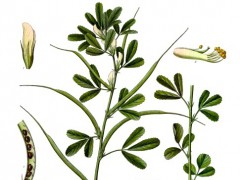Attractions
Fenugreek Greek hay
Also popularly known as fenugreek (fenugreek)

Fenugreek (Trigonella foenum-graecum) is a cultivated herb whose medicinal properties were used by the ancient Egyptians. And we still encounter it today. Fenugreek is mainly used in natural medicine and, to a lesser extent, in gastronomy.
Fenugreek originated in Asia and the Mediterranean, where it is still widespread today. It is an annual herb and flowers in June and July. The flowers turn white to yellow. Fenugreek has long and thin pods that contain up to 20 seeds each. The dried seeds of the herb are used for their medicinal and aromatic properties. The rest of the plant is processed as cattle feed.
Fenugreek and natural medicine
In the field of pharmacy, you can find fenugreek products under the categories "nutritional supplements" or "herbs". Sometimes we also see fenugreek labelled as a 'herbal drug'. Its seeds contain a large amount of mucilaginous substances, as well as steroidal saponins, sterols and flavonoids and, to a lesser extent, essential oil. Extracts of fenugreek seeds are intended for external and internal use.
External use of fenugreek
In folk medicine, fenugreek was most often used externally, in the form of ointments and decoctions. The mucilaginous substances soften the skin excellently, so the ointment from fenugreek is rubbed on, for example, hardened heels.
Interestingly, the ancient Egyptians used mixtures prepared from fenugreek seeds to embalm their bodies.
A poultice made of fenugreek and water (or vinegar) was applied to tibial ulcers and purulent nail beds. The gruel was spread on linen cloth and the wet dressing was ready. These poultices make particular use of the niacin (vitamin PP) contained in the seeds, which aids healing processes in the body and improves metabolism. Greek hay poultices are also a first aid for teenagers suffering from acne.
Internal use of fenugreek
When taken internally, fenugreek helps improve and speed up bowel peristalsis, relieves stomach problems and lowers blood cholesterol levels. It also helps against coughs, when it is often mixed together with honey.
The plant also contains an interesting substance called diosgenin. Diosgenin is a substance of natural origin that has a similar structure to the female hormone estrogen. Already in traditional medicine, the seeds of the herb were recommended to nursing mothers to increase breast milk production. And women in the Orient have in turn favoured the plant for its beneficial effects on the firmness and shape of their breasts. The estrogenic effects of the drug are still used today, although it has not been quantified how great this effect is. Still, breastfeeding mothers pass on a universally positive experience of the herb's effect on breast milk production. A combination with Benedict's wort (Cnicus benedictus) is recommended.
For internal use, fenugreek is most commonly available in the form of teas or swallowable capsules. The dried and crushed seeds of the herb can also be made into a porridge. However, the taste is often very bitter.
Sands and gastronomy
In gastronomy, fenugreek seeds are used as a spice. The spice is prepared from ground hard fenugreek seeds and is most often added to curry or chutney mixes. Fenugreek spices are not used on their own as they have a very strong to unpleasant smell.
